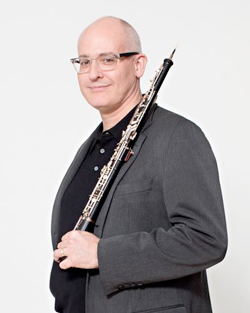by Jarrett Hoffman

Walters will be armed with his English horn and a stack of original poems this Sunday, January 21 at 3:00 pm at the Bop Stop for “Rhythms, Rhymes, and the Kitchen Sink,” part of the Heights Arts Close Encounters series.
Joining Walters, who is English hornist of The Cleveland Orchestra and professor at Oberlin Conservatory, will be bassoonist Drew Pattison, his new colleague at Oberlin, and pianist Edward “Teddy” Niedermaier of Chicago’s Roosevelt University. Walters will intersperse his original texts with musical selections by Sibelius, Debussy, Hendrik Andriessen, Dutilleux, Elgar, and Niedermaier himself. “I love reading in public as much as I like playing,” Walters said. See our Concert Listings for program details.
After graduating from Curtis, Walters moved to New York City and freelanced as a musician while earning a Master’s of Fine Arts in fiction and poetry at Columbia University. His writing credits include the cycle of poems Songs of Addiction, which was turned into an off-off Broadway theater production by La MaMa Experimental Theater Club, and ran for 36 sold-out performances at the now-defunct Broome Street Theater in New York.
After graduating from Columbia, Walters stepped away from writing for ten years. It was a productive time for his musical career, to say the least: he won the solo English horn positions in the Cincinnati Symphony, the Metropolitan Opera Orchestra, and Cleveland. “There’s nothing like an MFA in poetry to make the music profession look really good,” he said with a laugh.
But even though Walters wasn’t writing, the degree had changed the way he thought about music. “Stress and unstress, meter and time — manipulated for expression and organized for coherence. All that became fascinating to me.”
He’s convinced that his MFA, and his work writing libretti and other musical texts, are why he won the job at the Met. “When that audition came, I didn’t know much about opera,” he said. “I started learning the audition list from the texts. I got all the librettos, figured out exactly where the arias were in the plot, studied who was singing what to whom, and watched what the composer was doing with the text in the vocal line. Then I would see how the English horn part was mirroring that or conversing with it. It felt like my secret weapon.”
Walters admitted that a degree in poetry might be the one thing less marketable than a degree in oboe. “But for me, it was very practical because it gave me a way of thinking about music that was my own.” His gift for analogies and inclination for metaphor and simile affect his teaching, too. “Finding ways of explaining things to students, I can feel my Columbia tuition dollars at work.”
After that decade away from writing, what brought Walters back to the page was personal loss. In 2006 his close friend, Cleveland Orchestra bassist Charles Barr, was hit by a truck while cycling. He was 31. “About a year after that, I wrote a poem about him and a train ride we took down the coast from Seattle to L.A. on an orchestra tour,” Walters said. “I hadn’t written a word in ten years, but working it out that way felt really important to me. Then I started writing a lot.”
His re-entry into that world would usher in reading and publishing honors such as New Words (Akron Art Museum), Muse in the Museum (Allen Memorial Art Museum), and Poetry in the Garden (Cleveland Botanical Gardens and Case Western Reserve). He’s also been a featured guest for the Main Street Reading Series in Oberlin.
With two jobs and two kids, Walters stays busy, but orchestra tours provide moments of pause. “Train time, plane time, hotel time — it’s all very good poetry time,” he said. He makes good use of his regular commute to Oberlin as well, listening to The New Yorker Poetry Podcast.
These days when he comes back to poetry after time off, Walters said he feels restored. “It’s always like, ‘Ahh, that’s right’ — there’s something familiar and reassuring about writing again.”
Walters is so familiar with his poems that he won’t need to practice his delivery at all before Sunday. “They took me a long time to write, so they’re in there pretty deeply. It’s weird, but even if I come across a poem I wrote twenty years ago and start rereading it, I can kind of feel each word before it gets there.”
Photo by Tanya Rosen-Jones.
Published on ClevelandClassical.com January 15, 2018.
Click here for a printable copy of this article


